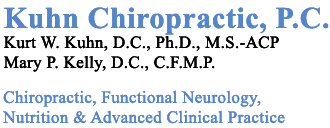Resources in Waterloo IA

Resources on Care for Pain in Waterloo IA. Dr. Kuhn served as an expert panelist in the Delphi consensus project for the following studies:
- Clinical Practice Guideline: Chiropractic Care For Low Back Pain
- Algorithms For The Chiropractic Management Of Acute And Chronic Spine-Related Pain
Dr. Kuhn was also featured as a back pain expert in the martial arts magazine Inside Karate article "Watch your back Avoiding and Treating Back Injuries":
Resources on Care for Developmental, Learning & Behavioral Conditions In Waterloo IA
Help for the underlying cause of AD/HD, OCD, Tourette syndrome, Asperger syndrome, Autism, Dyslexia, Learning Difficulties, Fatigue, Memory Problems, and Migraines. We put the puzzle of brain-based care together for you!
Brain-based and Evidence-Based Care for your child's learning and Behavioral needs: We don't just say we can help, we document it. Follow the links tiered to this page and you will find study after study in peer-reviewed scientific literature demonstrating that the tools we use are effective.
Dr. Kuhn's work is also published in peer-reviewed scientific publications. His 2005 Dissertation entitled "An Assessment of Carrick's Brain-Based Mode of Care in the Treatment of Functional Disconnection Syndrome: A Case Study" was one of the first published describing this type of care applied to developmental, learning, and behavioral disorders. His article published in the Journal of Chiropractic Medicine in December 2013 also demonstrated the effectiveness of his care.
We don't just rely on past research. We also document our care along the way. That way we can make adjustments in the care plan as needed to optimize progress and outcomes and tune our care to your loved ones specific needs.
A New Way of Looking at Conditions: Most doctors diagnose developmental and behavioral disorders based on their symptoms. The problem with this is that many different regions of the brain can cause the same symptoms. Another problem is the tendency to use treatments that cover the symptom and leave the problem to continue to worsen over time. We don't do that.
We diagnose and treat the brain and the rest of the nervous system functionally. We localize where in the brain or nervous system that function is being lost and rehabilitate it towards normal function. Follow these links to find out how others have been helped with Dr. Kuhn's care:
An assessment of Carrick's brain-based model of care in the treatment of functional disconnection syndrome
Functional disconnections and disconnections: Functional disconnection implies an interrupted circuit. Examples of this would include damage done to the brain during its development during the "pruning process." We are born with twice the number of brain cells that we need. This allows us to adapt to nearly any environment that we may be born into.
Somewhere around ages 18 months to 2.5 years our brain "prunes" and gets rid of unnecessary wiring so that our brain can function more efficiently. Unfortunately, if there is inflammation present during this time the body may read this and prune valuable wiring too, even if it is being used. This can create functional disconnections as it literally disconnects by damaging the connections within the circuits.
Functional disconnections are too much or too little function between two or more locations and can be evaluated via a variety of different measurements such as amplitude asymmetry, coherence, or phase lag. These concepts are measured by Quantitative Electroencelphalography or QEEG. These are discussed more fully on our QEEG page under functional neurology services.
Because brain science can get complicated very fast we sometimes simplify our descriptions to labels that describe the predominant area of involvement. Sometimes we use the description hemisphericity to describe which side of the brain is functioning lower relative to the other side.
Left Brain or Right Brain Dominant Conditions: Brain-based conditions are often simplified in their description as spectrums relating to the side of the brain that is most involved. For example:
The Right-Brain Spectrum: ADD, ADHD, OCD, Tourette syndrome, Asperger Syndrome, Autism
The Left-Brain Spectrum: Dyslexia, Learning Difficulties, Fatigue, Memory Problems, Depression, Migraines
While these simplifications are useful, it is important to understand that the nervous system is a system of systems and is much more complicated than just left or right brain concerns and there are individual differences that may vary from these generalizations. The brain has modules of function and our specialty is diagnosing which parts are low functioning and selecting the right tools for rehabilitating them back up normal. We look forward to helping you and your loved ones with their developmental or behavioral concerns!
OFFICE HOURS
Monday
9:00am - 12:00pm
3:00pm - 5:30pm
Tuesday
9:00am - 12:00pm
3:00pm - 5:30pm
Wednesday
9:00am - 12:00pm
3:00pm - 5:30pm
Thursday
9:00am - 12:00pm
3:00pm - 5:30pm
Friday
Closed
Saturday & Sunday
Closed
Kuhn Chiropractic PC
3602 Kimball Ave
Waterloo, IA 50702


